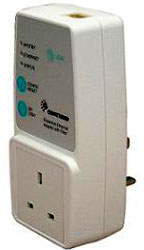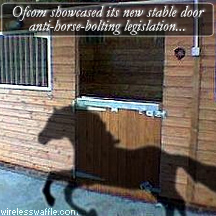 On several past occasions, dating back to 2008, Wireless Waffle has reported on how several users of the short wave spectrum including radio amateurs, broadcasters, air traffic controllers and NATO, have raised concerns about interference caused by power-line telecommunications (PLT) devices (such as the Comtrend unit pictured on the right). PLT devices allow the use of home electrical wiring to carry computer data by injecting radio signals over the wires. As electrical wiring is designed to carry signals with a frequency of 50 Hz and not 5 MHz, the injected radio signals have a tendency to leak out everywhere and cause radio interference over a wide area.
On several past occasions, dating back to 2008, Wireless Waffle has reported on how several users of the short wave spectrum including radio amateurs, broadcasters, air traffic controllers and NATO, have raised concerns about interference caused by power-line telecommunications (PLT) devices (such as the Comtrend unit pictured on the right). PLT devices allow the use of home electrical wiring to carry computer data by injecting radio signals over the wires. As electrical wiring is designed to carry signals with a frequency of 50 Hz and not 5 MHz, the injected radio signals have a tendency to leak out everywhere and cause radio interference over a wide area. Groups such as UKQRM and Ban PLT have long campaigned that PLT devices (also known as Power Line Adapters) should be taken off the market as they do not comply with the relevant emissions standards.
Over all of this period, the UK spectrum regulator Ofcom, has staunchly refused to accept that these devices contravene any regulations, though they have taken action in a number of cases where the interference they cause has exceeded even their expectations. Over the same timeframe, a number of other devices have also been found to cause high levels of radio interference, particularly cheap electrical devices, often imported on the grey market from China. These include things such as laptop power supplies, LED lighting and solar panel electrical controllers. Yet Ofcom continued to refuse to accept that anything needed doing.
It is therefore somewhat of a bolt from the blue that on January 15th, Ofcom released a consultation document, entitled 'Notice of proposals to make The Wireless Telegraphy (Control of Interference from Apparatus) Regulations 2015' in which it wishes to implement new controls over these devices by making it a criminal offence to operate them if they are causing interference to wireless telegraphy (e.g. radio services). Part of this seems to be driven by the fact that Ofcom were unable to deal with many interference complaints under existing regulations and that this could be regarded as a potential safety-of-life threat where the interference was caused to, for example, aeronautical services.
According to the consultation paper, there were 114 cases of interference reported in 2014, 'where undue interference was caused ... and capable of resolution'. Of those 114 cases, only 3 could be cured quickly using existing legislation and in the other cases it required voluntary action by the user of the equipment to bring about a solution. Under the proposed changes, all of these cases could be dealt with by law, meaning that instead of volunteering to fix the problem, users could be prosecuted if they didn't.
 The big question has to be whether such a change would make any difference. Would those selling the devices stop doing so? Presumably not, as there is no law against selling them, just using them. Would they warn buyers of the new law? Not if it damaged sales. And what will happen if Ofcom threaten prosecution to someone who believes they have been using equipment quite legally, having purchased it legitimately, and having seen the various markings on the box that said it complied with the necessary standards? Will Ofcom then look silly for allowing such devices to have been sold in the first place? Sadly, the UK legislation on such things is still somewhat muddy. It is possible to sell, for example, FM transmitters, mobile signal boosters and even GPS jammers. It is just not legal to plug them in and use them.
The big question has to be whether such a change would make any difference. Would those selling the devices stop doing so? Presumably not, as there is no law against selling them, just using them. Would they warn buyers of the new law? Not if it damaged sales. And what will happen if Ofcom threaten prosecution to someone who believes they have been using equipment quite legally, having purchased it legitimately, and having seen the various markings on the box that said it complied with the necessary standards? Will Ofcom then look silly for allowing such devices to have been sold in the first place? Sadly, the UK legislation on such things is still somewhat muddy. It is possible to sell, for example, FM transmitters, mobile signal boosters and even GPS jammers. It is just not legal to plug them in and use them. Ban PLT are recommending that as many people as possible respond to the consultation, encouraging the changes to be implemented. No doubt organisations which manufacture or sell the devices will be arguing against the changes and so it is important that those who use the radio spectrum, especially the short wave spectrum, respond to show the strength of feeling.
Ban PLT are recommending that as many people as possible respond to the consultation, encouraging the changes to be implemented. No doubt organisations which manufacture or sell the devices will be arguing against the changes and so it is important that those who use the radio spectrum, especially the short wave spectrum, respond to show the strength of feeling.There is an old saying in England, 'closing the barn door after the horse has bolted'. Effectively it means trying to solve a problem, after it has happened. The new powers proposed by Ofcom may have some effect in allowing Ofcom to convince users to turn off whichever device it is that is causing the problem, but it is by no means certain that the threat of 'turn it off or we will sue' is going to win anyone any friends, Ofcom, suppliers, BT and radio listeners alike.
add comment
( 306 views )
| permalink
| 



 ( 3 / 3558 )
( 3 / 3558 )




 ( 3 / 3558 )
( 3 / 3558 )

